John 5:24
"Home is the Sailor, Home From The Sea.... And The Hunter, Home From The Hill"

 Permission Granted To Come Aboard...
Permission Granted To Come Aboard...
..And Welcome To The Pirate's Lair!
a Division of DataCity, Inc.
Click Here and Return to The Pirate's Lair Home Page www.thepirateslair.com
OR
Click Here For British Royal Navy Dinnerware Tableware Page
OR
Click Here For British Royal Navy Rum and Grog Photo Historical Identification Page

British Royal Navy Oak Mixing Tub and Bucket used During the 19th and 20th Century reigns of King George III, Queen Victoria, Kings Edward and George, and Queen Elizabeth. Here Represents the largest and the smallest British Royal Navy Brass-Banded, Oak Wood the larger "Mixing Tub" and the smaller "Mixing Bucket" emblazoned with "The Queen God Bless Her" and "God Save Our King" in Raised Brass Letters.
These lidded oak tubs and buckets were used to Mix 105 proof Naval Rum, Water, Lemon or Lime Juice, and Sugar to Taste for the Daily 1/2 Pint Tot Served to "Jack"!
Call The Pirate's Lair @ 540-659-6209


The rarest of the rare - illustrating both the largest and the smallest oak mixing tubs and buckets.
The perfectly proportioned small oak mixing bucket (6.5"H x 7"W at the base) as seen sitting on the larger regulation mixing tub (28"H x 30"W at the base) in the left photograph, and then seen by itself on the right it certainly appears to have been used for its intended purpose (see photos below).
A retired former Royal Navy Officer and friend who currently works at the Royal Navy's National Maritime Museum mentioned that these types of small buckets were produced for and used in small messes such as the Chief Petty Officers Mess or the Officers Wardroom Mess in sharing their "neaters"!
The photo to the left shows the smallest "mixing bucket" actually used aboard British Royal Navy warships from the 19th century days of sail to the modern mid 20th century days of steel!
Authentic British Royal Navy Mixing Tub and Bucket (a specialized oak barrel of sorts) which was used to mix one part BRNIR (British Royal Navy Imperial Rum) with two parts water, and lime or lemon juice and sugar to taste!
The particular mixing tubs shown on this page are currently in the Naval Rum collection here at The Pirate's Lair providing us with first hand knowledge and hands-on experience in their design and construction.
In general these mixing tubs became a formalized piece of naval inventory in the 19th century during the reigns of King George III and Queen Victoria.
And since it was "the Crown" which purchased all of the rum to be used in mixing and dispensing "the tot" twice a day to all enlisted English sailors the world over it was only right to show honors by emblazoning the tubs with the blessing: "The Queen - God Bless Her", or in the case of a reigning King "The King - God Bless Him" or as seen on this smaller mixing bucket the shorter "God Save Our King".
After after Victoria's death in 1901 when her son King Edward (and later Kings George IV and V) the honor was changed to "The King - God Bless Him". Upon their deaths and the beginning reign of Queen Elizabeth the honor was again switched to "The Queen - God Bless Her", until the issuing of rum and grog was suspended in 1971.
Below are more various period photographs showing the dispensing of the traditional "tot" aboard various warships of the day all using the mixing tub whose basic construction did not change for over 100 years.
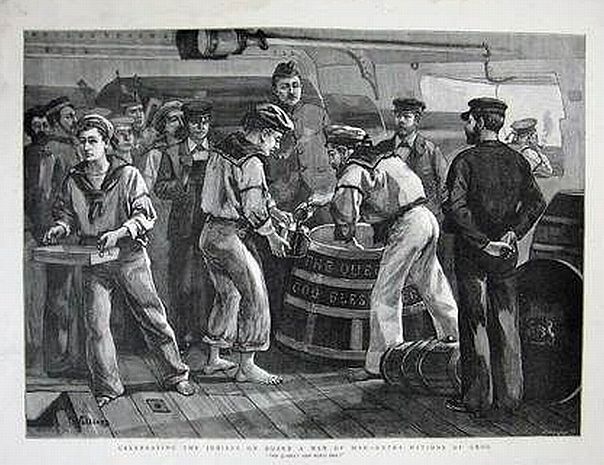










Above is the larger British Royal Navy 40 gallon "mixing tub" showing front and back, one of the largest produced at a 30" diameter base and 28" height, and probably used aboard a large 100+ gun man-of-war in the age of sail in the 19th century, or on a cruiser, battleship, or aircraft carrier in the late 19th and 20th centuries.
Note the wide brass bands circumferencing and holding the hand crafted oak staves together. In between the brass bands is the always traditional blessing or toast: "The Queen God Bless Her".
Now the authenticity of this mixing tub can be verified by the dark stains circumferencing the bottom and bottom portion of the staves in addition to the "stirring marks" left by whatever tool or stave was used to mix the rum and water. Additionally, there is the traditional red paint located on the bottom of the tub also as a further indication of authenticity. The rear of the tub also shows "screw holes" from a previously attached toast and appears to be "The King God Bless Him" indicating that this tub was in at least continued use from the early 1900s to 1970. It also appears that there was an even earlier toast attached to the rear of this tub and seems to be "The Queen God Bless her". Now this could be from Queen Victoria vintage or Queen Elizabeth - we shall never know except for perhaps getting the oak wood carbon dated.
The wooden lid of this tub is original and still sports the 3 holes where the regulation "star" was attached in some distant past. However today there appears to be a reproduction star and oak nut finial in place. See photos where you can see the 3 holes in the lid where the original star was affixed along with the cutout portion for the washer. We have been told by a source who was in the British Navy that towards the end of this tradition in the late 1960s and afterwards at the victualling yards when the Royal Navy was repairing these tubs to be taken out of service that parts and pieces were becoming unavailable so they used what is now called "reproduction parts" to make otherwise complete tubs.
There is also a metal band on the upper inside made of zinc to help hold together the oak staves. I was told that zinc was used for authentic tubs in that it would not rust during use. Cheaper steel or iron bands were used on reproduction mixing tubs since they were not concerned about rusting since they were not made to be actually used aboard ship.


Photo to the left illustrates the much smaller (6.5"H x 7"W) British Royal Navy Oak "mixing bucket" which would have been used aboard a very small vessel or perhaps in a specific wardroom or mess, such as a Chief Petty Officers mess. This "mixing bucket" does not appear to have been an official Royal Navy Mixing Tub constructed and inventoried by the Ministry of Defense, but more likely something which was purchased privately for use in small messes, such as a Chiefs Mess or an Officers Mess.
One of the smallest and perfectly proportioned standing only 6.5" high, 7" wide at the base and 6" wide at the mouth.
Like the larger mixing tub, note the brass bands circumferencing and holding the hand crafted oak staves together and in between the brass bands is the traditional and slightly variant blessing: "God Save Our King".
The significance of this particular blessing indicates that this mixing bucket was used during the Reign of King George III up until 1837 when Queen Victoria took reign and/or used after Queen Victoria's death in 1901 to 1957 during that span of years in which Kings Edward and George reigned and prior to Queen Elizabeths reign in 1958.

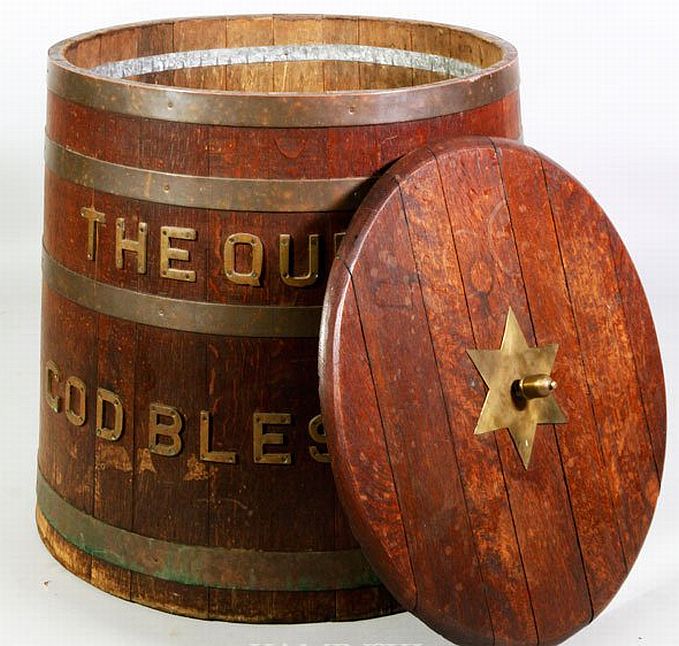
More photos of the large mixing tub in the collection at The Pirates Lair. Likely used aboard 19th Century Class 1 and 2 100+ gun Ships-of-War, 20th Century Battleships and Aircraft Carriers.


Photo showing the larger rear screws securing the brass bands onto the oak staves. IMPORTANT NOTE: Not easily seen in the photographs, but clearly visible during local inspection, are screw holes which previously secured the brass lettering for both "The Queen God Bless Her" and "The King God Bless Him". A certain indication that this mixing tub was used from the reign of Queen Victoria in the 19th Century, then the 3 Kings in the early-mid 20th Century, and finally Queen Elizabeth until this daily ceremony was discontinued in 1970!


Photo showing the two pirates in training with the mixing tub to illustrate comparative size, this tub weighing in at almost 100lbs is as much as one of those pirates! Note the closeup of the bottom band, rivet, brass raised letters and screws used to secure them (the letters, not the kids! -- is that CPS I hear knocking?).


Photo showing the top and underside of the lid, which is very heavy. Note the 6 pointed star which was the insiginia for the rating of "Purser" in the Royal Navy in charge of supplies and doling out the tot! The brass top is also called "the acorn" as that is what it looked like. The underside shows how the lid planks were held in place by two oak cross members securing each plank together in place with screws and presumably some sort of glue.


Photo showing the bottom and insides of the larger mixing tub. It appears that the mixing tub was recently refurbished at the Royal Navys MOD as the oak bottom has been reversed as it shows both staining and circular rubbings in the wood from years of use and mixing the grog. Note also the inside photo where the very bottom shows an even dark brown patina from when it was reversed as compared to the stains and circular rubbings found along the sides!
Only a professional hooper with experience in refurbishing these tubs could have performed this task which was mostly likely done just prior to or right after 1970 when all rum and grog equipment was shipped back to the Royal Navys Ministry of Defense in Portsmouth for final inventory count, refurbishement, and presenting the items to Officers and selling of the items to private collectors and clubs.
Below are photos showing the smallest of Mixing Tubs or a Mixing Bucket used in a Small Mess such as for Chief Petty Officers or Commissioned Officers.


Above photos show the small mixing bucket to the left with the pray "God Bless Our King" and in the right the bottom of the bucket. Note that the construction of the bucket and larger mixing tub are identical.


Above photos show the inside of the small mixing bucket and the small lid. The oak wood patina and insides stains indicate that this bucket was certainly used and not just for decoration, and the oak wood certainly appears to be ca 19th century. The only question remaining is was this used during the reign of King George III or during the 20th century reigns of Kings Edward and George IV and V? Or perhaps all three.


Above photos shows the rivets and riveting used on the lettering and bands of the small mixing bucket. Photo on the right shows the small bucket sitting on the larger mixing tub for comparison purposes


Photo showing the "Rum Corner" here at The Pirate's Lair. This is the collection of various sizes of copper rum measures, grog cups, lipped measures, funnels, demijohns, rum fannies or mess pails, books about rum and the tradition, a few bottles of Pusser's Royal Navy Rum, and now an authentic Mixing Tub! We only have a few more items to aquire and we will have a complete set of everything used to store, mix, and dispense "the tot" during the 19th and 20th centuries.
Besides the "mixing tub" itself, some of the more harder to find and rare items found in the above photos are British Royal Navy 19th Century "Battle Rattles", a 4 Imperial Gallon Copper Lipped Measure seen in the foreground and looks like a large pitcher, a few 1 Imperial Gallon Copper Rum Cups or Measures as they are called, a "Rum Fanny" or Mess Pail seen on the top shelf, a Royal Navy enlistedmans "Ditty Box" ca WWI, definitely the copper rum funnels are pretty rare, and the wicker covered porcelain demijohn with red stripe across the middle which held the pure British Royal Navy Imperial Rum (BRNIR) is also pretty rare as well.
Click here for a complete textual and photo identification, research and history of British Royal Navy Rum and Grog paraphernalia used in this time honored ceremony!
Below are links to other Antique Nautical and Naval Artifacts that may be of interest:
Because of heritage and lineage the US Navy imitated and mirror imaged much of both equipment and traditions as found in the British Royal Navy. As such the American Navy also had "Measures" in blue speckled graniteware but only five, from the largest 1 Gallon to 1 gill unit measure.
The US Navy equivalent "Measures" can be found by By Clicking Here - US Navy Measures.
Click HERE for WWII US Navy Anchor China
Authentic 100+ Year Old Nautical Antique Trunks
The Real Deal! Fully Restored Antique Trunks Like Sea Chests, Pirate Chests, Treasure Chests - Perfect as a Naval Retirement Gift, use as a Shadowbox and to store Uniforms and Service Memorabilia! |
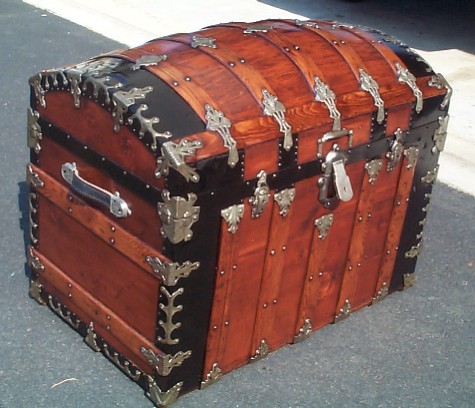
Click Here To Review Sample Engravings |
The Largest Selection of Antique Trunks on the Net to Choose From! |
OPTIONAL - Trunk Wood Engraving Examples and Prices
Custom Designed, Handcrafted, and Hand Lettered in Caligraphy on your Antique Chest |
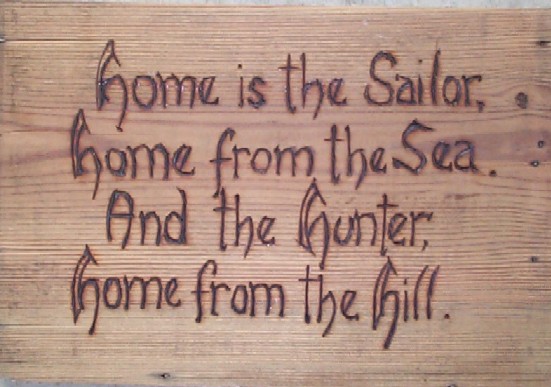
Click Here To Review Sample Engravings |
Personalize Your 100+ Year Old Antique Trunk in Perpetuity! |
Antique Trunks as a Shadow Box and Storage Chest!
Customer Photographic Examples of our Antique Trunks Being used as a Military or Naval Retirement Shadow Box and Storage Chest!! |
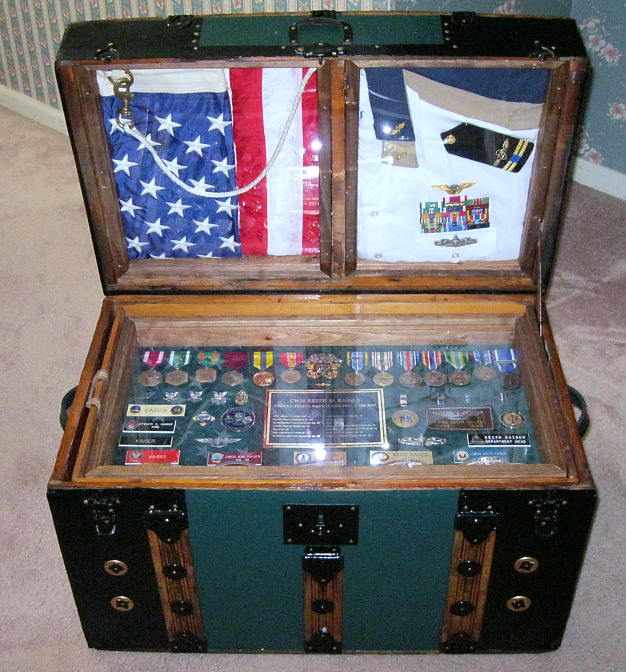
Click Here for Sample Shadow Box Photographs From Customers |
Why just get a shadow box or a newly made trunk with no history! One of our 100+ Year Old Nautical Antique Trunks can be used for both a Shadow Box and Storage Chest for your Uniforms, Photograph Albums, and Memorabilia! |
The Pirate's Lair
Division of DataCity, Inc.
78 Canterbury Drive
Stafford, Virginia 22554
Phone: 540-659-6209
Click Here and Return to The Pirate's Lair Home Page www.thepirateslair.com
"Service Disabled Veteran Owned Small Business"
Or
Email the-pirate@thepirateslair.com


 Or Click HERE to return to The Pirate's Lair Home Page and Gangplank!
Or Click HERE to return to The Pirate's Lair Home Page and Gangplank!
Copyright(c) 2008 All Rights Reserved - Unauthorized downloading, copying or use of any html code, text or images found on this or on any other pages within the www.pirateslair.com website will be prosecuted.
Music Credits: Donald Where's Your Trousers/Drunken Sailor medley by The Bards


































